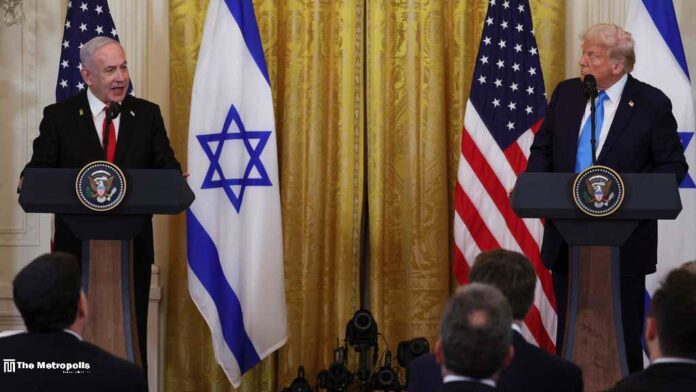US President Donald Trump proposed the permanent resettlement of Palestinians from the war-torn Gaza Strip to neighboring countries, calling Gaza a “demolition site” during pivotal discussions with Israeli Prime Minister Benjamin Netanyahu. Trump reiterated his suggestion for Jordan, Egypt, and other Arab nations to accept Gazans, claiming they had no option but to leave the area, which needs rebuilding after over 16 months of conflict between Israel and Hamas.
This time, Trump backed the permanent resettlement of Palestinians, moving beyond his earlier proposals, which were rejected by Arab leaders.
Just two weeks into his second term, Trump hosted Netanyahu at the White House to discuss the fragile Gaza ceasefire, strategies to counter Iran, and a potential Israeli-Saudi normalization deal. Trump emphasized that Gaza was “a pure demolition site” and suggested finding suitable land elsewhere for Gazans to live in “nice homes” away from violence. He proposed that Palestinians leave Gaza permanently for better living conditions.
In a joint press conference, Trump described Gaza as a “symbol of death and destruction” and suggested housing Palestinians in “various domains” in other countries, with the US overseeing the reconstruction and economic development of Gaza, though he provided no details on how this would happen.
Trump’s proposal echoed Israel’s far-right views but contradicted former President Biden’s stance against mass displacement of Palestinians. Many human rights advocates have criticized Trump’s idea, equating it to ethnic cleansing. The forced displacement of Gaza’s population would likely violate international law and face strong opposition from both regional and Western nations.
Hamas official Sami Abu Zuhri condemned Trump’s calls for expulsion, stating it would lead to chaos and regional tensions. Meanwhile, Trump and Netanyahu’s meeting, their first since Trump returned to office, highlighted their close relationship, especially after tensions between Netanyahu and President Biden over Gaza’s handling.
Their discussions came amid mediation efforts between Israel and Hamas over the next phase of the ceasefire and the release of hostages, with the region at a crucial crossroads. Trump’s actions and proposals continue to stir unease in the Middle East, as countries remain uncertain about the impact of his return to power on regional policies.
Despite his strong support for Israel and past achievements like moving the US embassy to Jerusalem and brokering the Abraham Accords, Trump’s return to office brings added uncertainty over his regional approach and potential influence on Netanyahu’s decisions.



